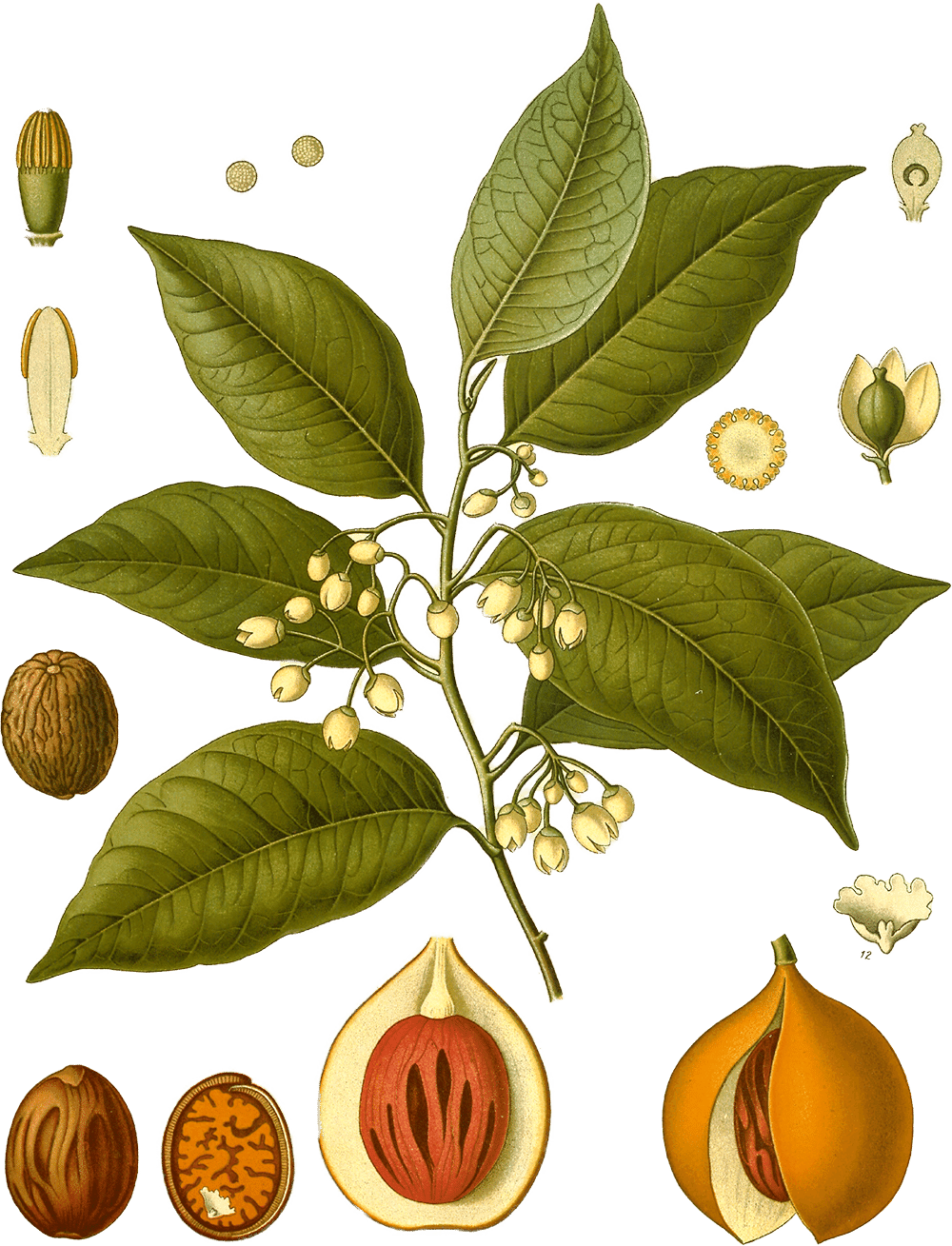Mace
The aril (seed-covering) of the nutmeg, also known as mace. It is related to nutmeg.
English: mace · Hungarian: szerecsendió-virág · Arabic: بسباسة · Hindi: जावित्री · Chinese: 肉豆蔻皮
Overview
| item | mace |
|---|---|
| taxon | Myristica fragrans Houtt. |
| family | Myristicaceae |
| regions | Malesia |
| continents | Asia-Tropical |
| part | aril |
| cultivation | Grenada; Indonesia |
| botanical_database | POWO; GBIF; TROP; EOL |
MACE is a culinary spice, cultivated for its aril. It is yielded from the plant Myristica fragrans Houtt., a tree in the Myristicaceae family, growing in wet tropical biome, with a native range of Maluku (Banda Is.).1
It is used primarily in confectionary; peptic ulcers. Its aroma is described as sweet, bitter, salty, with a heat index of 1.2
See more in ( Citation: POWO, 2024 POWO (2024). Plants of the world online. Facilitated by the Royal Botanic Gardens, Kew. Retrieved from http://www.plantsoftheworldonline.org/ ; Citation: Petruzzello, 2021 Petruzzello, M. (2021). List of herbs and spices. Retrieved from https://www.britannica.com/topic/list-of-herbs-and-spices-2024392 ; Citation: Wyk, 2014 Wyk, B. (2014). Culinary herbs and spices of the world. University of Chicago Press, joint publication with the Royal Botanic Gardens, Kew. ; Citation: Dalby, 2000 Dalby, A. (2000). Dangerous tastes: the story of spices. University of California Press. ; Citation: Hill, 2004 Hill, T. (2004). The contemporary encyclopedia of herbs and spices: Seasonings for the global kitchen. J. Wiley. ; Citation: Anderson, 2023 Anderson, I. (2023). The history and natural history of spices: the 5000-year search for flavour. The History Press. )
Illustration of Myristica fragrans from Köhler’s Medizinal-Pflanzen ( Citation: 1887 Köhler, H. (1887). Köhler’s Medizinal-Pflanzen in naturgetreuen Abbildungen mit kurz erläuterndem Texte: Atlas zur Pharmacopoea germanica, austriaca, belgica, danica, helvetica, hungarica, rossica, suecica, Neerlandica, British pharmacopoeia, zum Codex medicamentarius, sowie zur Pharmacopoeia of the United States of America. Franz Eugen Köhler. Retrieved from https://www.biodiversitylibrary.org/bibliography/623 ) II 132.
Distribution
Native and introduced habitats of Myristica fragrans3
Native areas: Maluku
Introduced areas: Gulf of Guinea Is., Comoros, Mauritius, Réunion, China South-Central, China Southeast, Taiwan, Assam, Bangladesh, Laos, Thailand, Vietnam, Jawa, Philippines, Samoa
Bibliography
- Anderson (2023)
- Anderson, I. (2023). The history and natural history of spices: the 5000-year search for flavour. The History Press.
- Dalby (2000)
- Dalby, A. (2000). Dangerous tastes: the story of spices. University of California Press.
- Hill (2004)
- Hill, T. (2004). The contemporary encyclopedia of herbs and spices: Seasonings for the global kitchen. J. Wiley.
- Köhler (1887)
- Köhler, H. (1887). Köhler’s Medizinal-Pflanzen in naturgetreuen Abbildungen mit kurz erläuterndem Texte: Atlas zur Pharmacopoea germanica, austriaca, belgica, danica, helvetica, hungarica, rossica, suecica, Neerlandica, British pharmacopoeia, zum Codex medicamentarius, sowie zur Pharmacopoeia of the United States of America. Franz Eugen Köhler. Retrieved from https://www.biodiversitylibrary.org/bibliography/623
- Petruzzello (2021)
- Petruzzello, M. (2021). List of herbs and spices. Retrieved from https://www.britannica.com/topic/list-of-herbs-and-spices-2024392
- POWO (2024)
- POWO (2024). Plants of the world online. Facilitated by the Royal Botanic Gardens, Kew. Retrieved from http://www.plantsoftheworldonline.org/
- Wyk (2014)
- Wyk, B. (2014). Culinary herbs and spices of the world. University of Chicago Press, joint publication with the Royal Botanic Gardens, Kew.
Medicinal Spices Exhibit. (2002). UCLA Biomedical Library: History & Special Collections. https://unitproj.library.ucla.edu/biomed/spice/index.cfm?spicefilename=taste.txt&itemsuppress=yes&displayswitch=0 ↩︎
